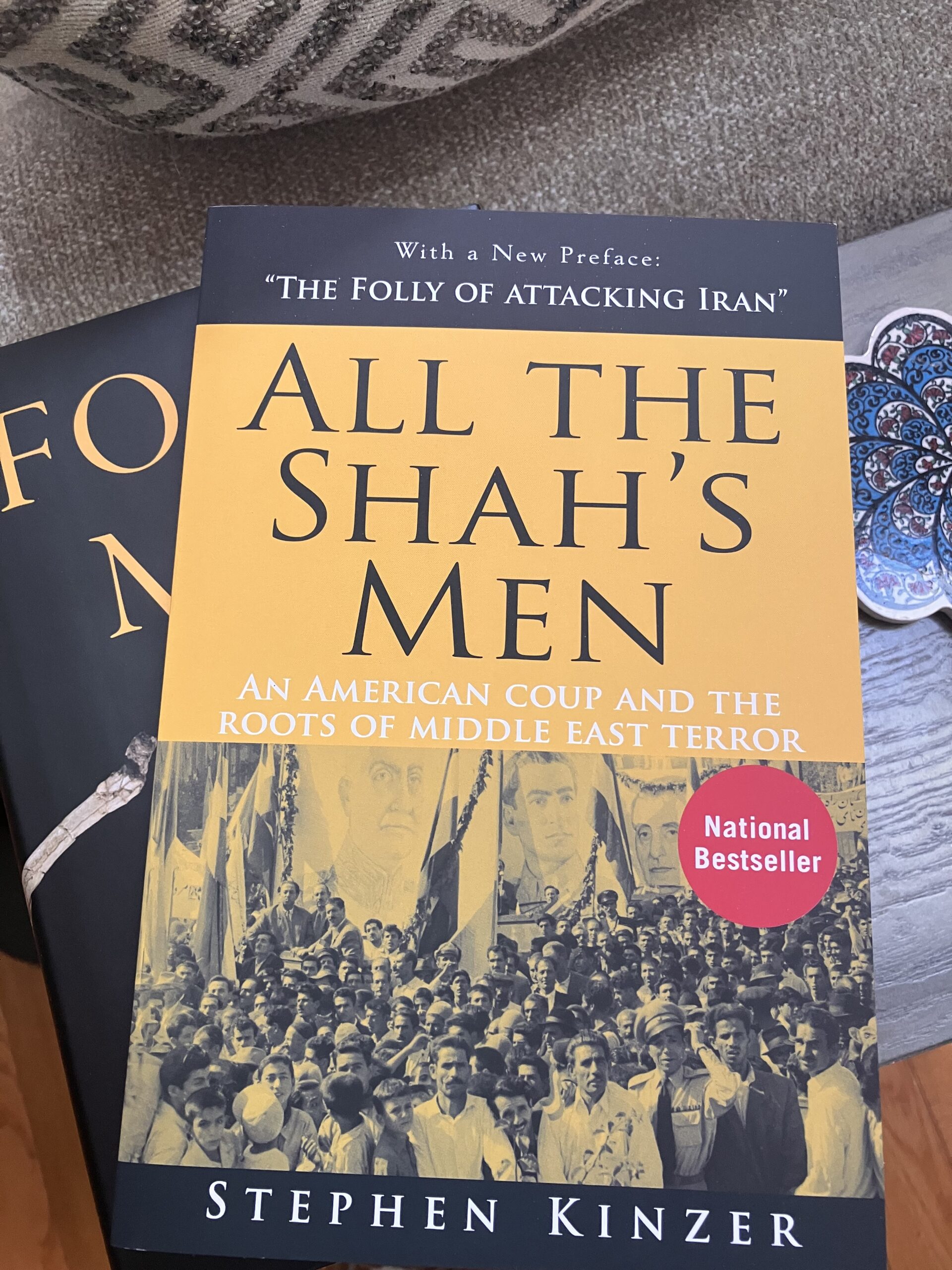Every Iranian New Year, we’d drive through Abadan, and I’d watch the flames shooting from the tops of those massive stacks—the oil refinery burning off excess natural gas like some kind of industrial volcano. The infrastructure stretched for acres, a sprawling testament to British engineering and ambition, built back when Persia was just another piece on the colonial chessboard.
I didn’t understand then what I was really looking at: the physical manifestation of why Iran doesn’t trust us. Any of us.
Since living in Iran, I’ve been fascinated—maybe obsessed is more accurate—with the role foreign governments and companies have played in the Middle East, particularly in the petroleum industry. It’s one thing to read about resource extraction and geopolitical maneuvering in a textbook. It’s another thing entirely to live in a country where the national memory is scarred by it.
Stephen Kinzer’s All the Shah’s Men is the book I wish I’d read before I ever set foot in Iran. Hell, it’s the book I wish every American would read before we collectively decide to have opinions about the Middle East.
Here’s what happens when you live in Iran: you sit around tables with educated, sophisticated people who will, with complete sincerity, spin conspiracy theories that sound absolutely bananas to Western ears. And I used to find it funny, this cultural tendency toward seeing plots within plots, secret hands pulling strings behind every curtain.
Then I read Ryan Holiday’s Conspiracy, which chronicles how Peter Thiel quietly, methodically, and very successfully destroyed Gawker because they outed him as gay against his will. Turns out conspiracy theories aren’t quite so ridiculous when you realize that powerful people actually do engineer elaborate, patient, multi-year schemes to achieve their ends. We Americans just aren’t used to fearing such things, thanks to our relatively stable history.
Iranians, on the other hand, have every reason to believe in conspiracies. Because they’ve lived through them. Because their popular prime minister—Mohammad Mosadegh, wildly beloved by his people—was actually, genuinely, factually overthrown in a CIA-orchestrated coup in 1953.
That’s not a theory. That’s history.
And that’s where All the Shah’s Men comes in.
Kinzer’s book does something remarkable: it explains not just what happened, but why it matters. It’s not just a recounting of events (though it is that, and brilliantly so). It’s a window into the Iranian national psyche, into why a country with such a long, proud history has so little patience for foreign meddling.
Iran isn’t some backwards outpost that just appeared on the map. It’s Persia, for God’s sake—one of the world’s great civilizations, with a history stretching back millennia. They’ve watched foreign powers trade in their resources for what amounts to glass beads. They’ve seen their own corrupt leaders sell them out again and again. They know what happens behind closed doors because it’s happened to them.
When the British Petroleum’s predecessor effectively owned Iran’s oil and gave the country a pittance in return, Mosadegh tried to nationalize it. He wanted Iran’s oil wealth to benefit Iranians. Radical concept, right? The British didn’t much care for that idea, and they convinced the Americans that Mosadegh was a communist threat. So we—the United States of America, land of democracy and freedom—orchestrated a coup to remove a democratically elected leader and install the Shah, who would be far more amenable to Western interests.
That moment? That’s the nadir of US-Iran relations. That’s where the hostilities that eventually led to the 1979 revolution and the hostage crisis actually began. Not with religious extremism appearing out of nowhere, but with us deciding that Iranian democracy was fine as long as it served our purposes.
All the Shah’s Men is a fabulous read, not just because Kinzer teaches the history of Iran in a clear, concise way—though he does that masterfully—but because he shows you the folly of toying with a nation that has a strong identity and a long memory.
He explains what was at stake then and what remains at stake now: access to oil, regional influence, the strategic geography of the Middle East. He makes clear why nations vie for power there and why, despite all evidence to the contrary, we keep making the same mistakes.
Most importantly, he illuminates why invading or attempting to control Iran is probably the stupidest thing any foreign power could do. You can’t bomb a proud people into submission, and you can’t expect them to forget what you’ve done.
What struck me most about the book is how it reveals the chess game happening behind the scenes—the back-channeling, the quiet machinations, the deals struck in rooms the average citizen never sees. We like to think of foreign policy as this noble, principled endeavor. All the Shah’s Men shows you the grubby reality: it’s often about resources, leverage, and maintaining the upper hand, regardless of the human cost.
If you want to understand why the Middle East is the way it is, why Iran views the West with such suspicion, why our attempts at influence so often backfire spectacularly—read this book. If you want to understand how we got here and why our “here” involves so much mutual hostility and mistrust—read this book.
And if you just want to read a damn good piece of non-fiction that reads like a thriller but happens to be true—definitely read this book.
Because the thing about history is this: if you don’t understand it, you’re doomed to keep repeating it. And God knows we’ve repeated this particular pattern enough times already.


